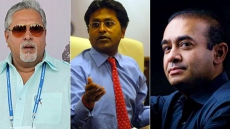Just ahead of the 2008 economic meltdown, when India was the flavour of the season at Davos, a top official of the erstwhile Planning Commission made a startling albeit roundabout admission: that the "inclusive growth" mantra of the time was not for the "aam aadmi" but for PLUs (people like us) and those in the higher strata.
Needless to say, the report I filed got spiked because there was no "direct quote" and inferences couldn't be attributed to the official in question.
Since then, there has been visual, empirical and written evidence that what the official implied was true: that two sections have been created in the middle class, with one zooming up and the other virtually reduced to hand-to-mouth existence, even as the economy has grown at an average of almost 7 per cent in the past 25 years. Growth certainly hasn't been inclusive.
In 2014, the slogan changed to "sabka saath, sabka vikas" but a new book, "What The Economy Needs Now" (Juggernaut), through a series of 13 essays, only buttresses the gloomy scenario that lies ahead as prominent economists like Abhijeet Banerjee, Gita Gopinath and Raghuram Rajan detail how to get the country back on track.
While the reforms of the recent past like GST and the Indian Bankruptcy Code are "commendable", says the overview, "Why Strong, Equitable and Sustained Growth Is Vital for India", it cautions against complacency as India is still one of the poorest countries in the G-20 and poor countries ought to grow faster because "catch-up" growth is easier.
"Also, the benefits of growth in India have been distributed unequally, with top incomes rising much faster than the rest. We have seen new environmental challenges in the form of sharp increases in both local pollution levels and carbon dioxide emissions that, if unchecked, threaten to stall or reverse progress," the book adds rather ominously.
What, then, are the solutions?
Abhijit Banerjee and Raghuram Rajan sum it up: "As we see it, rethinking government is key. Government capacity is limited. We need to target it better while trying to enhance it. Stability in government policy is important so that our farmers and firms can plan better, and markets can play a more effective role. Cooperative federalism - Centre and states working together and learning from each other - is essential."
They list the eight top challenges India faces:
* The massive aggregate fiscal deficit of the states and the Centre combined leaves fewer, costlier resources for private investment.
* Three sectors that are distressed today are agriculture, power and banking - despite massive past government intervention, and often because of it.
* We need a better business environment - whether to create the jobs for those leaving agriculture, urban schools or universities, or to ramp up our woefully inadequate exports.
* Sustainable growth requires more effective but less burdensome legislation. Our cities are choking and climate change is upon us.
* Government has to provide for benefits but it is always not suited to deliver them. As a first step, beneficiaries of all specific government subsidy programmes should have the choice between cash transfers and benefits in kind.
* We need more skilled personnel in government - at higher levels in technical areas like digitization, trade negotiation and environmental regulation, but also at lower levels outside the larger cities. More lateral entrants, merging into the permanent civil service, are desirable near the top.
* The Right to Education Act focuses on input requirements for schools that have little bearing on learning outcomes, which have deteriorated alarmingly. Learning must be our central focus (to deliver) a minimum level of basic skills to every child.
* We must address the coming explosion of non-communicable diseases which will require engagement with front line providers.
The question now is: Who will bell the cat?
